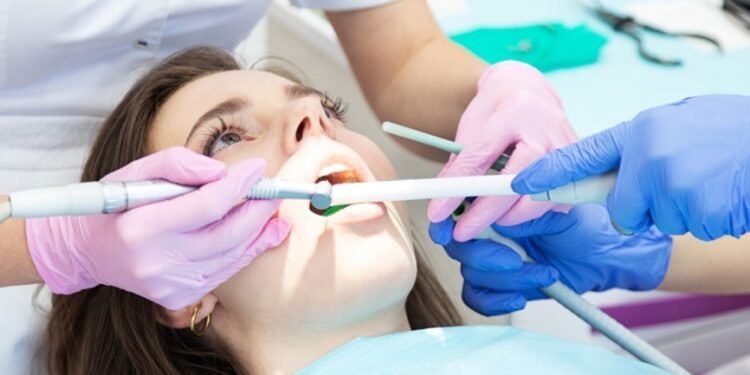What vitamins are good for teeth? We all know that brushing and flossing are pivotal for maintaining a sparkling smile, but did you realize that the vitamins you fuel your body with can significantly influence your oral well-being too? This article delves into the world of essential vitamins that promote robust teeth and gums, shedding light on the delectable foods that can enrich your diet with these vital nutrients. The beauty is most of these foods are not only wholesome but also a treat for your taste buds!
What Vitamins Are Good For Teeth?: Importance of Teeth-Boosting Vitamins
Before we dive into the treasure trove of teeth-friendly vitamins, let’s understand why they matter. With its teeth and gums, your mouth takes the first step in processing the nutrients you ingest.
A study published in the International Journal of Environmental Research and Public Health emphasizes that chewing serves as the gateway to extracting the maximum nourishment from your food.
Conversely, a deficiency in essential nutrients can lead to oral problems, including inflammation and tooth loss. To counter this, ensuring a steady intake of the right vitamins through your meals and supplements can significantly bolster the health of your teeth and gums. Let’s explore five pivotal vitamins that contribute to oral vitality.
1. Calcium: The Bone And Tooth Protector
Calcium’s role isn’t confined to your bones; it’s equally pivotal for your teeth. The National Institutes of Health reveal that calcium is a cornerstone mineral for the human body, facilitating the formation and upkeep of strong bones and teeth. Surprisingly, you might already be incorporating calcium-rich sources into your diet. Dairy wonders like milk and yogurt boast a readily absorbable form of calcium.
If you’re seeking non-dairy alternatives or wish to amplify your calcium intake, consider embracing broccoli, collards, kale, mustard greens, turnip greens, or nuts such as almonds, brazil nuts, sunflower seeds, and tahini. Keep in mind that gentle cooking methods like steaming or sautéing, rather than boiling, preserve the calcium content. Additionally, if you’re seeking an extra boost, calcium supplements can also be a valuable addition.
2. Phosphorus: The Tooth Enamel Guardian
Phosphorus steps up as another indispensable vitamin for nurturing strong teeth. By enhancing the body’s calcium absorption and utilization, phosphorus actively bolsters teeth strength by shielding and reconstructing tooth enamel. Fortunately, this mineral is abundant in various foods. Meats, dairy, whole grains, fish, eggs, and protein-rich options constitute excellent sources of phosphorus, often satisfying your daily requirements without the need for supplements.
3. Vitamin D: The Sunshine Vitamin for Oral Health
Vitamin D boasts a prominent role in safeguarding your teeth. This vitamin’s scarcity can lead to oral issues like gum inflammation, cavities, and gum disease. Vitamin D’s influence stems from its pivotal role in bone and tooth mineralization.
Sun-kissed oily fish like salmon, mackerel, and herring delivers a hearty dose of vitamin D. Additionally, fortified foods like milk and breakfast cereals contribute to your vitamin D intake, making this vitamin quite accessible. If required, vitamin D supplements can also be a reliable option.
4. Vitamin C: The Gum’s Best Friend
Vitamin C emerges as an unsung hero for both teeth and gums. It’s vital for teeth health and a key player in gum vitality. This vitamin nurtures the connective tissues that anchor your teeth in place. Insufficient vitamin C levels can pave the way for bleeding gums and gum disease. Remarkably, vitamin C’s abundance is found in everyday foods like citrus fruits, peppers, sweet potatoes, berries, and kale. The option of supplements is also at your disposal, ensuring you maintain optimal vitamin C levels.
5. Vitamin A: The Saliva Booster
Vitamin A, renowned for its benefits for eyes and skin, also extends its virtues to your oral cavity. Notably, it plays a role in elevating saliva production. Saliva not only aids in breaking down food but also combats bacteria between your teeth. The likes of orange-hued fruits and vegetables such as carrots, sweet potatoes, and bell peppers offer a generous supply of vitamin A. Fish and egg yolks also contribute to this nutrient. For a more targeted approach, vitamin A supplements are readily available.
Timing Matters: When to Embrace Vitamin Supplementation
A wholesome diet can inherently supply you with these teeth and gum-friendly vitamins. However, there are scenarios where supplements can offer an advantageous boost. If you’re contemplating supplement incorporation, it’s wise to consult your dentist or physician. Certain dietary supplements might interact with prescription medications, necessitating professional guidance.
If your eating habits already revolve around balanced meals rich in fruits and vegetables, chances are you’re already reaping the rewards of these teeth-loving vitamins. But if concerns linger regarding your vitamin levels, don’t hesitate to converse with your dentist. Their insights can guide you in selecting appropriate supplements or foods that enrich your diet.
Final Words: What Vitamins Are Good For Teeth?
So, Armed with the knowledge of how these vitamins contribute to your oral health, you’re equipped to embark on a journey toward enduring oral care. With a palette of vitamins at your disposal, why not embark on a culinary adventure, exploring new recipes that celebrate these nutrient-packed delights?




